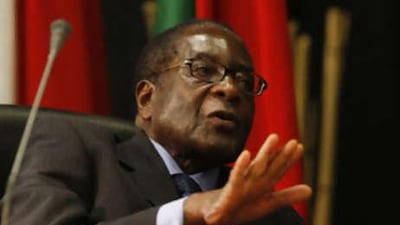HARARE, ZIMBABWE // Two Zimbabwe opposition politicians were arrested today as they entered parliament to be sworn in, their party said. The arrests, and a government announcement that the Zimbabwean president, Robert Mugabe, had appointed loyalists to several posts, were likely to fuel opposition accusations Mr Mugabe is undermining stalled power-sharing negotiations. One of the men arrested today, Eliah Zembere, was among seven Movement for Democratic Change (MDC) activists police have said they were seeking, alleging they were involved in election violence.
The other, Sure Mudzingwa, was not on the list, and the two uniformed and three plainclothes officers who made the arrests did not say why nor where the two were being taken. In a statement, the opposition party said police also tried to arrest a third member, who is on a team trying to negotiate the power-sharing agreement, but he "was rescued by other MDC members of parliament". Police spokesman Wayne Bvudzijena said he was unaware of today's arrests, adding: "It would be illegal for anyone to be arrested while they were proceeding to parliament."
Independent human rights groups have said Mr Mugabe's forces were responsible for most of the violence since the opposition won the most seats in the March 29 legislative elections. Opposition leader Morgan Tsvangirai beat Mr Mugabe and two other candidates in presidential elections held alongside the legislative balloting, but did not gain the simple majority of votes needed to avoid a runoff. Mr Mugabe and Mr Tsvangirai have entered into power-sharing negotiations. Opposition spokesman Nelson Chamisa said the MDC remained determined to take up seats in parliament, which Mr Mugabe was due to open tomorrow for the first time since the elections nearly five months ago.
Mr Chamisa said that the arrests were politically motivated, an attempt by Mr Mugabe's ZANU-PF party to regain control of parliament. ZANU-PF had controlled parliament from independence in 1980 until the March vote. "ZANU-PF are in a desperate attempt to try and stop or abort our victory," Mr Chamisa said. "It's a struggle. We have to fight it out." Mr Tsvangirai's party has 100 seats in the 210-seat legislature, Mr Mugabe's party has 99, and a faction that broke away from the opposition has 10. An independent politician who broke away from Mr Mugabe's party has the remaining seat. Mr Tsvangirai had criticised the reconvening of parliament given the deadlock in power-sharing talks mediated by South African President Thabo Mbeki.
Leaked documents from the talks show Mr Tsvangirai balked at signing a deal based on an offer making him prime minister with limited powers and answerable to Mr Mugabe, who would remain as president. The documents show the prime minister would be deputy chairman of the Cabinet, and the president and the prime minister would need to agree on ministerial posts. With the prime minister reporting regularly to the president, Mr Mugabe's power would be left virtually intact.
Today, state media reported that Mr Mugabe had appointed eight governors and three senators, all ZANU-PF loyalists. One of the new senators, Patrick Chinamasa, is a Mugabe hardliner who lost his parliamentary seat in March and who has led the ZANU-PF team in the power-sharing negotiations. The opposition has argued that the appointed governor positions should be abolished, saying their only function is to provide power and salaries for Mr Mugabe's "cronies". The political impasse has worsened Zimbabwe's economic meltdown. Official inflation is given as 11 million per cent, but independent financial institutions say it is closer to 40 million per cent amid acute shortages of food, gasoline, medicine and most basic goods.
* AP

